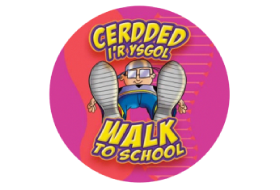Walk to School
Page updated on: 15/05/2025
Our Walk to School programme encourages you to walk, cycle or scoot to and from school with your child/children.
Walking to school benefits pupils, parents, the school and the local community in a variety of ways:
- It develops pedestrian and road safety skills
- Reduces traffic congestion around the school gates – no more fighting for the last parking space
- It saves time – it’s often quicker to walk (even a little bit) than to sit in traffic!
- Pupils arrive at school more alert and on time
- Less car emissions means improved air quality
- It promotes moderate physical exercise.
If you’d like to give it a go, the following schemes will provide you with some ideas of how to get started and useful resources to download.
Walk on Wednesday / Walk once a week
Why not set your child/children a challenge to walk to school at least once a week for a whole term or even the whole school year. Download the record card to track your child’s progress on their challenge to walk to school once a week.
Park and Stride
If you live too far away from the school to walk the whole journey, why not park away and walk the last 5/10 minutes? This will assist with keeping the school gates clear of congestion at the beginning and end of the school day.
Which way today
The Which Way Today Challenge is a week-long class versus class competition run in schools to see which class can ‘Step’ away the furthest from your school during specially designated ‘Which Way Today’ weeks.
Starting at the nearest landmark on the Which Way Today map to your school, each child will be able to colour in a footstep (or two) on the map every time he or she travels to school by foot, on a bicycle, using public transport, car sharing with other children or parks and strides8. The winning class will be the one that colours in the most footsteps per pupil and gets the furthest around Carmarthenshire, in one week.
*Park and stride - parking at least 5 - 10mins away from the school, and safely walking the rest of the journey.

